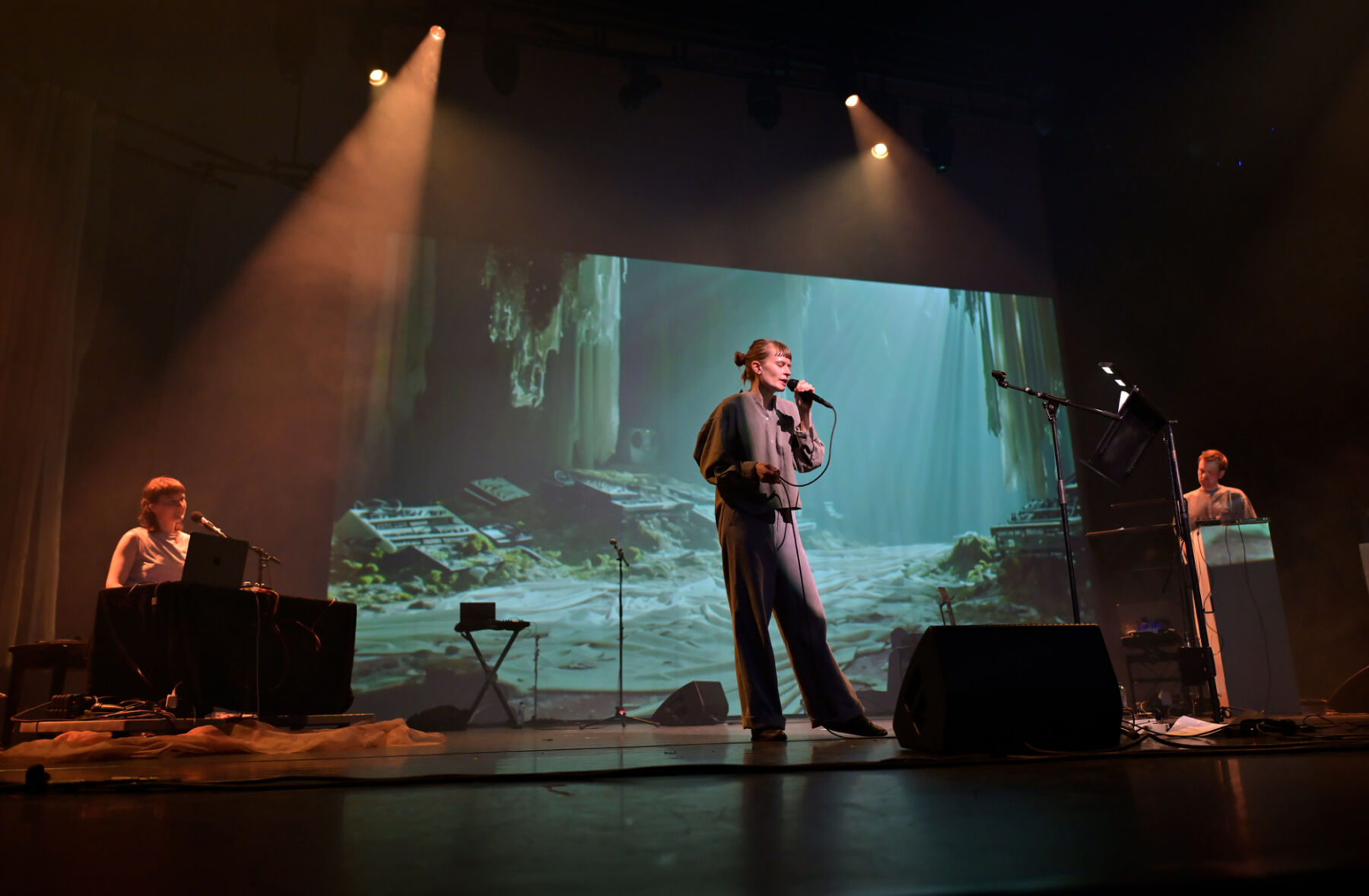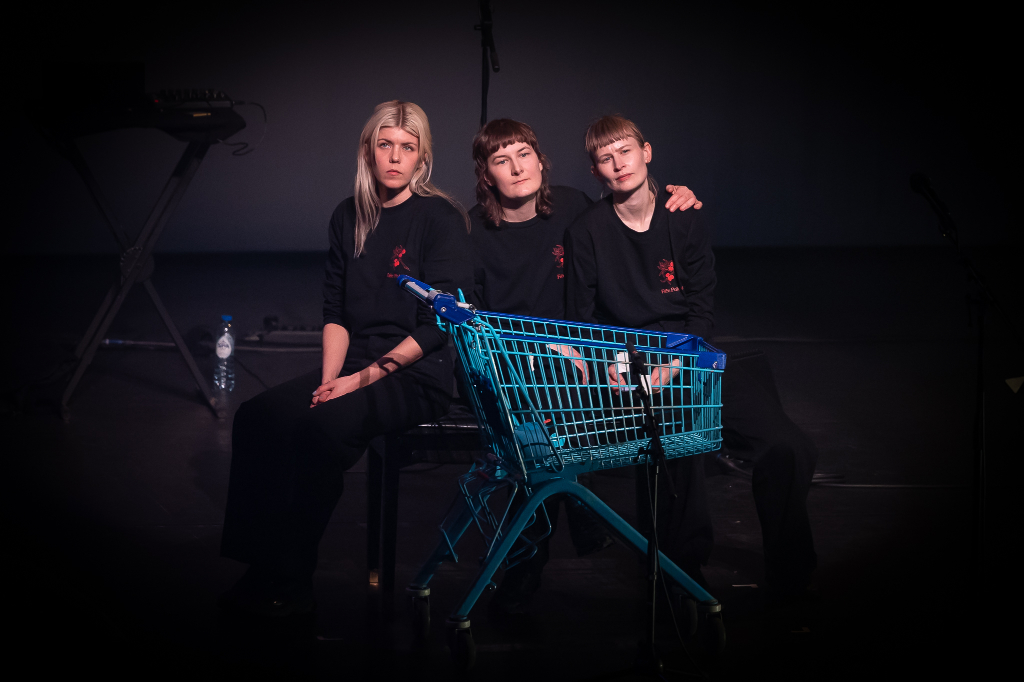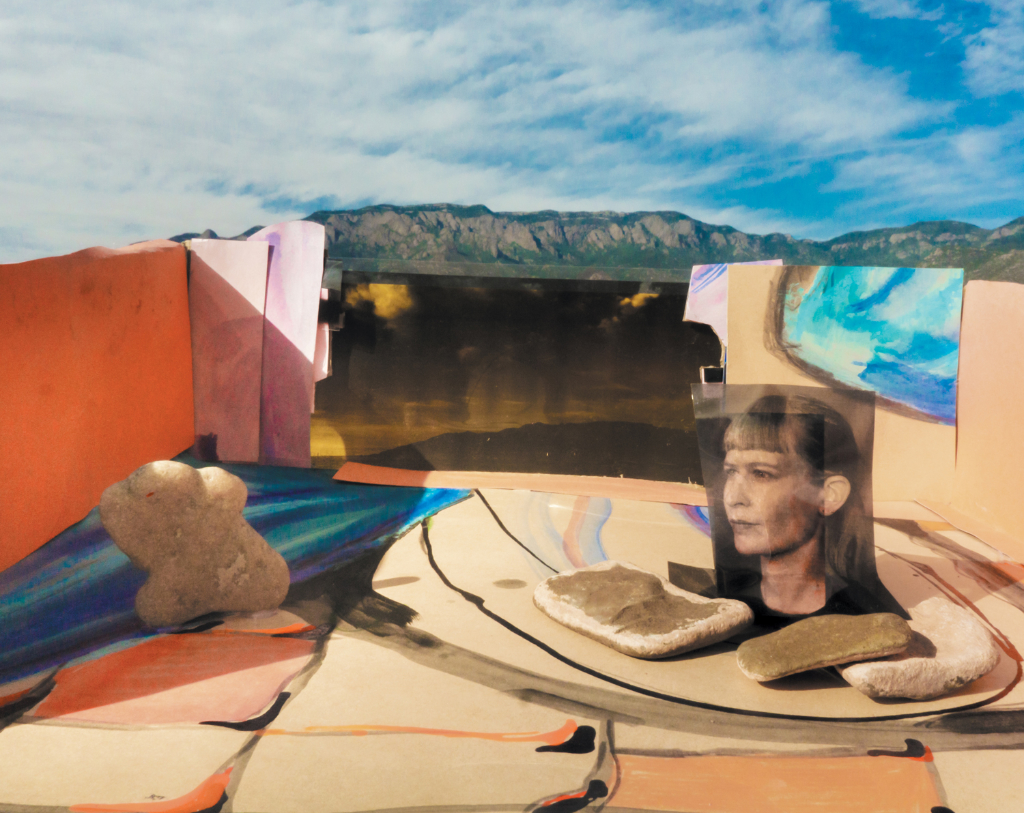Interview by Natalie Mariko

Norwegian musician and writer Jenny Hval’s artistry weaves between experimental pop sensibility and a fine-tuned, personal literary thematic. Her albums are self-contained deep dives, exhausting a particular modality or concept to create a visual and sonic language which aims to create a unique backdrop for examining gender, queerness, politics and the creative process itself. Hval crafts highly allusive narratives and sounds which interrogate and morph the outer limits of what ‘pop’ is traditionally ‘supposed’ to be.
Here we examine her artistic development across varying disciplines. 2016’s Blood Bitch – an album that reimagines the chilling echoes of 1970s horror – was in my view a turning point that expertly wove together the sonic experimentalist’s disparate influences and expressive outlets. It took Hval’s collaborative, world-building approach to lyrical storytelling that playfully and uniquely reinterpreted the notion of a ‘concept album’. In contrast, her latest work is typified by a candid and solitary introspection. 2022’s Classic Objects and what I would view as its fictional complement, the novel Girls Against God (first published in English by Verso in 2020), extrapolate autobiographical notes into stranger audiovisual-literary landscapes.
Classic Objects’ instrumentation retains a subdued delicateness which alternatively wraps the listener in a welcoming embrace or sweeps into forest-clearing crescendos, while Hval’s soprano evokes an almost uncanny nostalgia-at-the-windowsill feeling or a studio tour where the objects of the artist’s private fascinations have been exposed to the elements and taken on that same forest’s living vibrancy. References to her study in America, touring, familial relationships and the very act of creativity are simultaneously an individual artistic product and a touching story of a long and highly variable career.
Girls Against God, by contrast, is like that forest at night. Far more playful and pointedly political in its intention, the work approaches its periodically auto-fictional material as a means of redefining the borders between a feminine experience and Norway’s highly influential black metal scene, between the country’s edification of masculine artistry (Edvard Munch makes an appearance) and the girlhood that artistry instrumentalises for its own benefit, or simply between us girls who don’t want to follow any fucking rules. That sort of exchange and come-together attitude is integral to her work, an evolution of sound and self through collaborative symphonies of noise and friendship (recently typified by her project, Lost Girls, with fellow Norwegian musician, Håvard Volden) to more solitary, biographical verses (as in Classic Objects).
Her latest music, recently on display at Rewire Festival in Den Haag, offered festival attendees glimpses of personal revelation and Internet Age comunal re(self)determination set against the backdrop of the world’s shared solitude and reconnection after the era of pandemonium.

You studied comparative literature, played in a doom metal band as a teenager, have written multiple novels and your album output and live performances are audio-visually distinct. It’s perhaps easy for others to pigeonhole or summarise depending on how they’ve come to know your work–but how would you describe yourself?
I’d say I’m a writer, composer and unpopular pop artist with a background in a lot of studying. And I’m old enough to have done many different things and worked with many different people.
I’ve read that you had originally planned to enter into academia and that it took time before creative pursuits became a priority. How has the academic informed or complemented your approach to writing and performing?
I come from a family of workers, so I didn’t know being an artist could be a thing for someone like me until I had been doing it for a long time. I grew up loving books, reading, writing and analysing everything, so it seemed like endless studying would be my life.
Do you remember the first song you heard? What drew you away from academia and towards music?
I have no idea what the first song I heard was, but I imagine it would be something playing in the hospital café when I was born. The week of my birth the number one hit in Norway was Johnny Logan’s “What’s Another Year”, to be replaced soon after by Olivia Newton-John and John Travolta’s “Xanadu”. One of those maybe.
I first discovered your music through the 2016 album Blood Bitch while in a horror seminar at university. The dark, vampiric tonal quality captured and interestingly repurposed 1970s horror film tropes. It was a fictional landscape that felt self-contained in scope. Your latest album, Classic Objects, feels wide open and narratively personal, with themes like the artistic process itself or, in tracks like “American Coffee”, directly questioning your own life choices as they relate to creativity. When you look back on these older projects, how much of yourself do you see?
I see myself in all of my projects, though in different ways. Blood Bitch was in many ways a fun academic project. It was so full of references. I felt like it was a pop music collage or essay in many ways, with myself removed a bit lyrically. But it’s also a very personal sound work. And it’s a very particular, personal sound.
I worked with noise icon and friend of mine Lasse Marhaug on Blood Bitch.
We worked for quite a long time and the very joyful conversation we had in that time period was condensed into the album. That is also a very big part of ‘me’—communicating collaboration, friendship and dialogue in sound. A more telepathic collaboration in sound would be Lost Girls, my project with Håvard Volden.
Classic Objects didn’t have this kind of dialogue in sound. It was written in the deep dark of the pandemic, alone in a room. So it had to be lyrically more biographical for that reason. But with a more open-ended and band-like sound. I think I needed that more acoustic, played reality in my life at the time of recording it, having other people come in and perform, to expand and refurnish the lonely pandemic space I had written about.
You’ve also written several novels. How has the process of writing narrative fiction influenced or changed the way you approach making music?
Girls Against God came out in 2018 and kind of began with Blood Bitch. My previous novel, Paradise Rot, was published in 2009. I always wrote narrative fiction, but most of the time it becomes so much better when I compress fifteen pages of prose into 3 lines of a song. Classic Objects was very much like that—compressed prose which didn’t quite work. It needed space.
In Girls Against God, you write about loving film over novels because they ‘end in black’ whereas the blank pages at the end of novels bring to mind ‘walking into a cloud’. What’s a film you’ve seen recently that’s had the opposite of this effect? A film that’s brought you walking into a cloud?
I don’t think I’ve seen anything that’s had the opposite effect. I did write that purely about colour. I’ve always been frustrated with the whiteness of paper.
Your writing has been compared to Kathy Acker and Chris Kraus. How does that comparison make you feel? In what ways is it accurate? In what ways do you want to subvert that expectation?
I love both writers, but I don’t really think I write like any of them, if anything I admire them to death. But I have certainly read them, so perhaps it leaves a trace in me.
What’s a piece of art you’ve experienced recently that you keep on returning to? Something you’ve read or seen or heard that won’t seem to let you go?
I have had art fatigue over the past few years, and watched or listened to very little actually. I am not a Blood Bitch anymore, that super referential creature of the night. The last thing I remember that I made an association to was a weird early 90s album, Maggie Reilly’s Echoes.
With Lost Girls Håvard and I have a song in an exhibition at the MUNCH museum in Oslo at the moment – it opened on April 26th – and it’s about bringing Munch as a painter into nature, focussing on how he has used landscape, seasons, etc. During the opening I kept thinking of Echoes because it has that strange, simplified naiveté of nature from the past. A strong idea about how we can all return to Mother Earth and it will be better. I love that.
A lot of the plot of Girls Against God takes place in relation to the internet. How has technology, technological progress or new tools of expression like AI affected your artistic process, if at all?
I am quite lazy with tech, so it affects me mostly as a lyricist/reader. I like some technology but I’m better as an audience. But I try to follow people who crack open and find opportunity in new development, like the Interdependence podcast by Holly Herndon and Mat Dryherst.
You’re primarily a solo artist, but in the novel, the narrator starts a ‘band’ with two girls. How do you feel about being, first of all, a woman musician and, secondly and in contrast, what it means to be a girl in a band?
The world today is too intersectional and fluid to answer that, and that is a great thing.
You recently performed at the Rewire festival in the Netherlands. How was that experience for you? What about the festival exceeded your expectations? What surprised or underwhelmed you?
I loved it, although it was crazy, as we had so little time to set up all our stuff. I love Rewire, and felt very well taken care of, also from a curational point of view. Excellent programming. I had very little time to see or do anything else than perform, so the rest of the question I am not qualified to answer.
When you look into the future, what do you hope to be doing when you’re old? What do you look forward to accomplishing? What are you afraid you won’t be able to accomplish?
I don’t know! Is that okay? The world right now seems so crazy. We’re in the middle of a genocide.
What is your chief enemy of creativity?
Scrolling.
You couldn’t live without…
Apart from my family and friends and socialism and art… Perfume.






